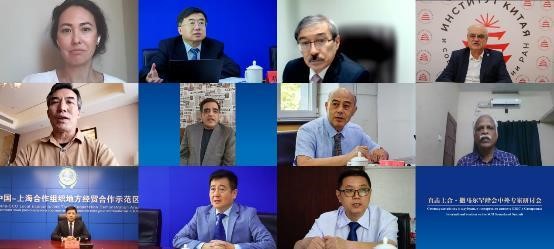International seminar on the SCO Samarkand Summit held in Beijing
 0 Comment(s)
0 Comment(s) Print
Print E-mail China Pictorial, September 18, 2022
E-mail China Pictorial, September 18, 2022

As the 22nd Meeting of the Council of Heads of State of the Shanghai Cooperation Organization (SCO) was held from September 15 to 16 in Samarkand, Uzbekistan, the International Seminar on the SCO Samarkand Summit was co-hosted in Beijing by the CICG Center for Europe and Asia (China Pictorial Publications) and the Administrative Committee of the China-SCO Local Economic and Trade Cooperation Demonstration Area (SCODA). Experts and scholars from SCO member states including China, Uzbekistan, Russia, Kazakhstan, India, and Pakistan joined the event online or in-person. Attendees expounded on the significance of Chinese President Xi Jinping's visit to two Central Asian countries and his attendance at the SCO Samarkand Summit. They also explored how the SCO can carry forward the Shanghai Spirit, respond to the complex and ever-changing international landscape, and safeguard regional and global peace and security.
Sun Zhuangzhi, director of the Institute of Russia, Eastern Europe, and Central Asia Studies at the Chinese Academy of Social Sciences, suggested SCO countries build consensus to respond to challenges brought by complex regional and international situations and develop the SCO into a platform synergizing China's Belt and Road Initiative (BRI) and other countries' major initiatives.
Daniyar Kurbanov, acting director of the Center for International Relations Studies under the Ministry of Foreign Affairs of Uzbekistan and former Uzbek Ambassador to China, stressed that Xi's attendance at the Samarkand Summit evidenced how much importance China places on Central Asia, the SCO, and China-Uzbekistan relations and that the summit would open a new chapter for the SCO by contributing to Eurasia's development.
Vladimir Potapenko, former deputy secretary-general of the SCO, opined that Xi's visit to Kazakhstan and Uzbekistan represented a milestone in China-Kazakhstan and China-Uzbekistan relations, and that SCO countries should enhance mutual understanding and improve related institutions as the organization faces new opportunities and challenges.
Ma Xiaolin, director of the Institute for Studies on the Mediterranean Rim at Zhejiang International Studies University, said that SCO countries should be committed to a path of healthy and steady development, strengthen coordination and respect each other's concerns, pursue collective security and economic development, and uphold coexistence and prosperity of diverse civilizations.
Xu Tao, deputy director of the Euro-Asian Social Development Research Institute at the Development Research Center of the State Council of China, said that the Samarkand Summit demonstrated the SCO's determination to practice multilateralism and that Iran's inclusion as a full member of the SCO represented the expansion of the friend circle of the international anti-hegemony community.
Rama Chandran, former chief editor of the Indian daily Janmabhumi, predicted that the Samarkand Summit would facilitate agreements on connectivity and high-efficiency transport corridors and a roadmap for local currency settlement among member states. The SCO, like BRICS, is a vehicle for India and China to coexist peacefully in the current era seen by many as the Asian century, he added.
Zhang Dong, deputy director-general of the Department of Eurasian Affairs of the Ministry of Commerce of China and deputy director of the Administrative Committee of SCODA, opined that SCODA would seize the important opportunities for development presented by the SCO Samarkand Summit and promote full-fledged pragmatic cooperation with SCO countries.
Li Ziguo, director of the Department for European-Central Asian Studies at the China Institute of International Studies, said that the Samarkand Summit provided an opportunity for the SCO to publicize its concepts and solutions to address major governance issues concerning international politics and international economics.
Gulnar Shaimergenova, director of the Center for Chinese Studies in Kazakhstan, commented that Kazak President Kassym-Jomart Tokayev has called for wider unleashing of the potential of the Silk Road Transport Corridor on many occasions, a testament to the country's confidence in the outlook of BRI cooperation.
Makhdoom Babar, president of Daily Mail Pakistan and chairman of the Pakistan Institute of China Studies, called the SCO Samarkand Summit especially important for the regional security situation in Afghanistan and Central Asia at large, as well as the security of the world. The SCO, as a multilateral cooperation platform, has become more vibrant and effective over the past decade, he added.
Jiang Yonggang, president of the CICG Center for Europe and Asia (China Pictorial Publications), chaired the seminar and delivered a closing speech. He noted that the SCO family has become bigger and more influential in the global arena over the past two decades and predicted that the media and think tanks would play a bigger role in building a closer SCO community with a shared future.






Go to Forum >>0 Comment(s)